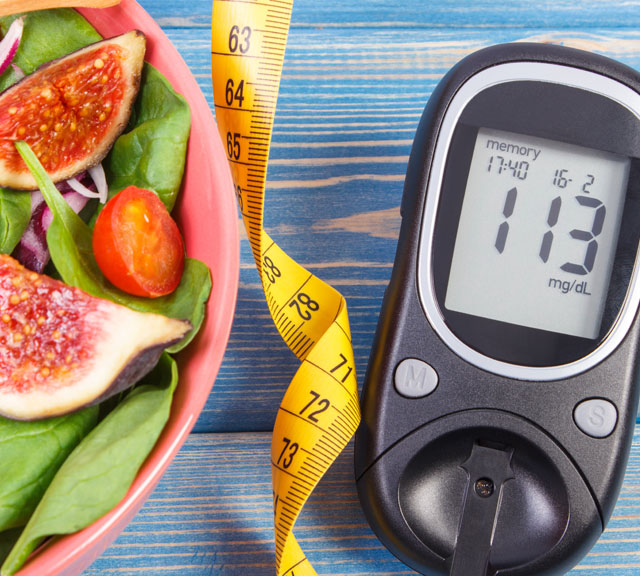Hyperglycemia: Manage the Dangers of High Blood Sugar

Find Your Perfect Match
Answer a few questions and we'll provide you with a list of primary care providers that best fit your needs.
High blood sugar, or hyperglycemia, can be dangerous if you have diabetes. The condition occurs when your body does not properly use insulin or does not make enough insulin.
The American Diabetes Association says hyperglycemia occurs when blood sugar levels are above the normal ranges:
- Fasting or pre-meal blood sugar: 80 to 130 mg/dl
- One to two hours after eating: less than 180 mg/dl
You should talk with your doctor about what hyperglycemia looks like for you, based on your diabetes symptoms and how you manage the condition, says Carol Nartker, registered dietitian and certified diabetes educator, Premier Health.
Even people with well-controlled diabetes can find themselves with hyperglycemic complications when they are sick and unable to properly take their medicine.
Types of High Blood Sugar and Common Symptoms
Living with diabetes means learning to manage your condition. If your blood sugar becomes extremely high, it can lead to dehydration and severe health consequences and a possible emergency room visit or hospital stay.
Your doctor or diabetes educator can help you design a plan to regularly check your blood sugar levels and recognize when you are in a trouble with high blood glucose.
Hyperglycemia comes in two types:
- Fasting high blood sugar – when glucose levels are above 130 mg/dl after not eating or drinking for at least eight hours
- After-meal (postprandial) high blood sugar – when blood glucose levels are above 180 mg/dl one to two hours after eating
Common symptoms of high blood sugar may include:
- Increased thirst
- Frequent urination
- Feeling tired
- Itchy, dry skin
- Blurry vision
- Dizziness
If you notice these signs in yourself or a loved one, check your blood sugar levels. If you have questions, call your doctor.
Be sure that your family members, co-workers and others you spend time with know the signs of hyperglycemia.
“The more you know about your diabetes and your own body, the more savvy you can be about diabetes management,” Nartker says.
What Causes High Blood Sugar?
If you have diabetes, you are at risk for hyperglycemia. The condition can be caused by changes in your normal routine, changes in how your body reacts to your regular medicine and many other lifestyle factors.
Your doctor or diabetes educator can help create a diabetes self-management plan that includes:
- Healthy meal plan. Work with a dietitian to find a meal plan that provides the nutrients you need without overeating. Stick to your food guidelines as much as possible.
- Education about how to handle changes in your blood sugar levels — such as a pattern of rising blood sugar levels — and when to call the doctor for help.
Your Personal Diabetes Management Plan

It’s important to remember that factors that cause high blood sugar and ways to lower it are different for everyone.
Factors that can increase your blood sugar include:
- Stress
- Pain
- Being sick
- Forgetting to take your medicine
- Not following your meal plan
There are many strategies for treating high blood sugar. Talk with your doctor about the combination of medicines, insulin and lifestyle changes that might work best for you, including:
- Exercise
- Rest
- Meditation
- Increased hydration
- Following your meal plan
Rarely, efforts to reduce high blood sugar can lead to low blood sugar, hypoglycemia.
What You Can Do to Prevent High Blood Sugar
Living with diabetes can be scary, but there are ways to manage your blood sugar levels to avoid complications of high blood sugar and other diabetes complications:
- Check your blood glucose often
- Wear a medical ID bracelet or necklace
- Control your stress levels
- Stay hydrated
- Control carbohydrates in your diet
“The more you know about your diabetes and your own body, the more savvy you can be about diabetes management,” Nartker says.
If you have any questions about managing your diabetes, talk with your health care provider or diabetes educator.
Find Your Perfect Match
Answer a few questions and we'll provide you with a list of primary care providers that best fit your needs.
Source: Carol Nartker, registered dietitian and certified diabetes educator, Premier Health; American Diabetes Association; Diabetes Quebec




